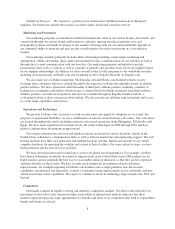Expedia 2010 Annual Report Download - page 21
Download and view the complete annual report
Please find page 21 of the 2010 Expedia annual report below. You can navigate through the pages in the report by either clicking on the pages listed below, or by using the keyword search tool below to find specific information within the annual report.by Standard & Poor’s, Moody’s Investor Service or similar ratings agencies, increases in general interest rate
levels or weakening in the credit markets could increase our cost of capital. More recent capital markets
experience suggests credit spreads can be significantly higher for companies with lower credit ratings, impacting
returns for bondholders and increasing the cost of potential future debt issuances.
In addition, we have experienced, and may experience, declines in seasonal liquidity and capital provided by
our merchant hotel business, which has historically provided a meaningful portion of our operating cash flow.
The extent of such impact is dependent on several factors, including the rate of growth of our merchant hotel
business, payment terms with suppliers and relative growth of businesses which consume rather than generate
working capital, such as our agency hotel, advertising and managed corporate travel businesses. We are also
accumulating a greater portion of our cash flow in foreign jurisdictions than we had previously and the
repatriation of such funds for use in the United States, including for corporate purposes such as acquisitions,
stock repurchases, dividends or debt refinancings, may result in additional U.S. income tax expense. We also
continue to evaluate the use of the agency model versus the merchant model in each of our markets and any
change in our relative use of the agency model could have a materially adverse impact on our working capital
and liquidity position.
System interruption and the lack of redundancy in our information systems may harm our businesses.
We rely on computer systems to facilitate and process transactions. We have experienced and may in the
future experience system interruptions that make some or all of these systems unavailable or prevent us from
efficiently fulfilling orders or providing services to third parties. Significant interruptions, outages or delays in
our systems, or deterioration in their performance, would impair our ability to process transactions and decrease
our quality of service that we can offer to our travelers. These interruptions could include security intrusions and
attacks on our systems for fraud or service interruption (called “denial of service” or “bot” attacks). If we were to
experience frequent or persistent system failures, our reputation and brands could be harmed.
In addition, we do not have backup systems or contingency plans for certain critical aspects of our
operations or business processes, many other systems are not fully redundant and our disaster recovery or
business continuity planning may not be sufficient. Fire, flood, power loss, telecommunications failure, break-
ins, earthquakes, acts of war or terrorism, acts of God, computer viruses, electronic intrusion attempts from both
external and internal sources and similar events or disruptions may damage or impact or interrupt computer or
communications systems or business processes at any time. Although we have put measures in place to protect
certain portions of our facilities and assets, any of these events could cause system interruption, delays and loss
of critical data, and could prevent us from providing services to our travelers and/or third parties for a significant
period of time. Remediation may be costly and we may not have adequate insurance to cover such costs.
Moreover, the costs of enhancing infrastructure to attain improved stability and redundancy may be time
consuming and expensive and may require resources and expertise that are difficult to obtain.
Mr. Diller currently controls Expedia. If Mr. Diller ceases to control the company, Liberty Media
Corporation may effectively control the company.
Subject to the terms of a Stockholders Agreement between Mr. Diller and Liberty Media Corporation,
Mr. Diller holds an irrevocable proxy to vote shares of Expedia stock held by Liberty. Accordingly, Mr. Diller
effectively controls the outcome of all matters submitted to a vote or for the consent of our stockholders (other
than with respect to the election by the holders of common stock of 25% of the members of the Board of
Directors and matters as to which Delaware law requires a separate class vote). Upon Mr. Diller’s permanent
departure from Expedia, the irrevocable proxy would terminate and depending on the capitalization of Expedia at
such time, Liberty could effectively control the voting power of our capital stock. Mr. Diller, through shares he
owns beneficially as well as those subject to the irrevocable proxy, controlled approximately 61% of the
combined voting power of the outstanding Expedia capital stock as of December 31, 2010.
In addition, under a Governance Agreement among Mr. Diller, Liberty Media Corporation and Expedia,
Inc., as amended, each of Mr. Diller and Liberty generally has the right to consent to limited matters in the event
that we incur debt such that our ratio of total debt to EBITDA, as defined in the Governance Agreement, equals
18
























